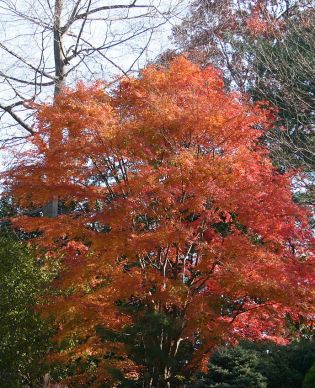On Human Transience and Mortality: Clive James’ JAPANESE MAPLE

Have been playing catch up with a few New Yorker back issues in the last couple of days – like buses, you get none, and then suddenly several arrive in the post in a pile. So I was stopped in my tracks by Japanese Maple, a new poem by Clive James. He’s a remarkable writer and commentator – his is a sizzling combination of high intelligence, unsnobbish cultural magpie-ism (if that’s not a thing, it jolly well should be) and laugh-out-loud-wit.
But he now has terminal cancer. As a result he knows he’ll never make it back to his native Australia before he dies. (Here is an interview he gave back in 2013) He is confined to Cambridge and the UK. So here he writes of the tree planted by his daughter in their garden.
And it is deeply poignant.
Your death, near now, is of an easy sort.
So slow a fading out brings no real pain.
Breath growing short
Is just uncomfortable. You feel the drain
Of energy, but thought and sight remain:Enhanced, in fact. When did you ever see
So much sweet beauty as when fine rain falls
On that small tree
And saturates your brick back garden walls,
So many Amber Rooms and mirror halls?Ever more lavish as the dusk descends
This glistening illuminates the air.
It never ends.
Whenever the rain comes it will be there,
Beyond my time, but now I take my share.My daughter’s choice, the maple tree is new.
Come autumn and its leaves will turn to flame.
What I must do
Is live to see that. That will end the game
For me, though life continues all the same:Filling the double doors to bathe my eyes,
A final flood of colors will live on
As my mind dies,
Burned by my vision of a world that shone
So brightly at the last, and then was gone.
It seems I was not the only one to be so moved – I did a little digging around and found that it was republished in the Guardian last week. It prompted this moving piece by George Szirtes. In my albeit limited and inexpert view, I’m sure he’s right – this poem is already ‘up there’, or rather it really will be.
But surely there is one key literary thread that Szirtes has missed. These words surely echo Old Testament meditations on human mortality, so often shaped by reflections on the natural world and cycle of seasons.
My days are like the evening shadow; I wither away like grass.
But you, Lord, sit enthroned forever;
your renown endures through all generations. (Psalm 102:11-12)
Then the imagery is even stronger in the next psalm:
13 As a father has compassion on his children,
so the Lord has compassion on those who fear him;
14 for he knows how we are formed,
he remembers that we are dust.
15 The life of mortals is like grass,
they flourish like a flower of the field;
16 the wind blows over it and it is gone,
and its place remembers it no more.
17 But from everlasting to everlasting
the Lord’s love is with those who fear him,
and his righteousness with their children’s children— (Psalm 130:13-17)
What relief, what sustenance to know that Japanese Maple‘s last words are NOT the last words…







Thanks. It’s a wonderfully affecting meditation. Pleased to have found your thoughtful blog and I look forward to regular reading here. Regards from Thom at the immortal jukebox (give it a spin!).
Thanks for this Mark, I’d somehow missed the news about Clive James. Enjoyed his poem and your reflections on it.